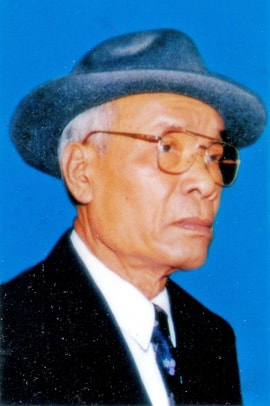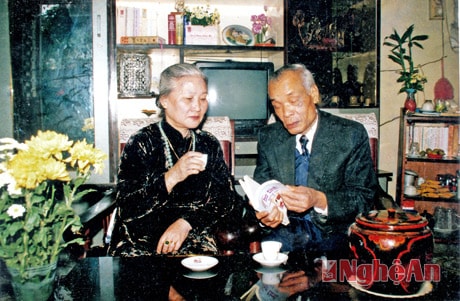Poetry full of life's fruits
(Baonghean) -There are people who spend their whole life pursuing poetry, which is a continuous experiment. Poet Phan Xuan Hat does not have to bother with these schools or trends. Writing poetry, for him, is simply writing from frustrations, poetry springs from a state of "tense strings", so at the age of 82, Phan Xuan Hat's poetry still bears fruit in life...
 |
Although he does not have many talented poems, Phan Xuan Hat has poems that touch the depths of human life:“In this world, my dear, I live a life of slavery/ At eighty, I lie in misery/ From dust to dust, who can know all the sorrows…”.Or:“From birth to old age/ My love, you are a lonely person…”.
Last year, at the age of 81, Poet Phan Xuan Hat published a collection of poems. Among the 151 poems selected from over 60 years of writing poetry with 10 published collections, there are many poems expressing Phan Xuan Hat's poetic concepts, but these 4 lines of poetry impressed me the most:“If I don’t write the truth/ I will stop writing poetry/ Because if I write the opposite/ Readers will be indifferent…”. That is why, from “Full Moon” to “The remaining peaceful green space”… and now “Phan Xuan Hat’s Poetry Anthology”, readers still recognize a genuine Phan Xuan Hat, sometimes concise and classical like the shadows of sentences and words.
I am particularly impressed by Phan Xuan Hat's poem "Strength of Grass". The poem is full of concerns about people: Grass lives in the park/ People take care of it every day/ Grass lives on the roadside/ Letting people trample on it... But the ending is really strong: Grass never regrets its whole life/ Young, fertile, and green strength/ Living its life to the fullest/ No matter what, where.
Poet Phan Xuan Hat was born in 1931 in Dong village, Trang Thanh commune (now Hoa Thanh commune, Yen Thanh), in a Confucian family, a family of scholars and a family with a rich revolutionary tradition. Phan Xuan Hat received an educational foundation from his family, and studied at the famous Hue National School, so he knew Chinese characters, was good at French and English. He belonged to the generation of poets who matured during the resistance war against the French. Poems with the influence of folk songs promptly encouraged the resistance war such as: "We pay tax on rice in the warehouse/ Tomorrow we will go to the front, rice will be taken to the station/ Big warehouses, small warehouses all over the village/ Oh, everyone, protect/ Rice still exists, the French will lose...", until now many people still know them. His famous poem “Happiness Not Yet Complete” written during the resistance war against America: “Holding you in my arms/I kiss your rosy cheeks/Suddenly the radio late at night broadcasts the worst news/America tested nuclear bombs underground/The two of us hesitate/The kiss, a half-finished kiss…/Happiness, my dear/A complete wisdom filled the basket…” was widely read and became a timeless poem.
He was considered a living dictionary by his friends and colleagues. He could remember exactly a Tang poem with an allusion or a detail of a foreign writer. Thanks to his extensive reading, diligence in observing and researching, he discovered and explained many interesting literary details. I once heard him explain that the lotus branch in the famous folk song: "Yesterday, I was bailing water by the communal house/ I forgot my shirt on the lotus branch" was a species of lotus that grows on land in some Northern pagodas, not the common water lotus. It was also thanks to the poem "Single Bamboo Flower" that readers understood: "Bamboo chopsticks on a bowl of rice placed in the middle of a coffin/ Each layer of flowers speaks of a generation..."
Poet Vo Van Truc recounted that when he was a student of Phan Xuan Hat in high school, when teaching the poem "Mau tim hoa sim" by Huu Loan, when he reached the line "The early autumn wind returns, making the river water shiver", teacher Hat firmly stated that the character in the poem died from drowning. Later, Vo Van Truc asked poet Huu Loan, and the poet confirmed and added: "Perhaps due to the sensitivity of a poet, Phan Xuan Hat felt that heartbreaking truth in the poem". Poet Phan Xuan Hat once explained to me the meaning of the detail of the blue blood of a character in "One Hundred Years of Solitude" by Gabriel Garcia Marquez, from which I discovered the Latin American literature that was still quite new to Vietnamese readers in the late 70s and early 80s of the last century.
With a broad knowledge of literature, good at foreign languages, and very sincere with collaborators, he has been one of the pillars of Thanh Nien Publishing House for decades, assigned to edit two difficult book sections: history books and translated books. Phan Xuan Hat is a talented midwife of many books, including famous novels such as "Chestnut Flower Season" (Van Linh), "Soldier's Footprints" (Nguyen Minh Chau), "Saddle Poetry" (Hoang Yen),... the bedside books of the youth of the time such as "The Steel Was Tempered That Way", "Youth Guards", "Buffalo Fly"...
During his years as an editor at the Youth Publishing House, he cycled to work every day, diligently reading. In the afternoon, after cleaning the house thoroughly, he continued with literature and writing. He paid attention to each sentence, each word, and gave the author feedback on every small detail. Seeing how much he paid attention to cleaning the house, I once jokingly asked him: “What is the similarity between cleaning the house and editing?”. He smiled gently and said: “Of course, cleaning the house while there is still trash is not acceptable, but if there is still standing water causing someone to slip and fall, it is even more unacceptable. Editing is the same…”.
Phan Xuan Hat only knew about office work, reading books and writing poetry. He was very vague about economics and was almost uninterested. The Do Nghe quality was strong in him. Strangely, during the subsidy period, living in the expensive capital, he was still able to raise 5 children to be educated, mature and successful. I asked him about this, and he said: It was all thanks to his wife. Hearing him say that, I remembered the story Professor Phan Cu De told when he was studying at Hanoi Literature University: “In the early 50s, Phan Cu De and Phan Xuan Hat taught literature together at Dien Chau High School (Nghe An). At that time, Phan Xuan Hat was very fond of a beauty queen in Phuong Lich village, Dien Hoa commune.
Going alone was awkward, so Phan Xuan Hat invited Phan Cu De to go with him. Unfortunately, "our buffalo eats our village grass", the men of Phuong Lich village did not accept a guy from "Dinh Yen Thanh market land" coming to flirt with the most beautiful girl in the village, so both of them were thrown mud several times". Mrs. Cao Thi Bach Huong, Phan Xuan Hat's wife, once told me: "At that time, there were intellectuals, children of mandarins, children of rich families, but she only accepted Phan Xuan Hat because she loved his poetry. She loved him and married him, and did not ask anything from him. The girl from Nghe An followed her husband to Hanoi, and she struggled alone to "take care of five children" with a poet husband. Only later did I know: Mrs. Cao Thi Bach Huong was the younger sister of Major General, Doctor Cao Thuong Luong, former Political Commissar of the famous La Mit Battalion of Phu Yen during the resistance against the French.
 |
| Poet Phan Xuan Hat and his wife - Mrs. Cao Thi Bach Huong. |
There are people who spend their whole life writing poetry, constantly experimenting. Phan Xuan Hat does not have to waste time struggling with this school or that trend. Writing poetry, for Phan Xuan Hat, is simply writing from frustrations, poetry springing from a state of "tense strings". Therefore, when talking about Phan Xuan Hat, I do not talk about poetic talent but about poetic soul. His poetry is directed towards people, respecting human values: In this life, no one is small/ On earth, we all stand on the same level/ Low and high have different positions/ Is the value of a person based on the ladder?
In addition to the loneliness of human life, a question that has troubled him throughout his poetic life, at the age of over 80, Phan Xuan Hat also suffers from another loneliness: The beautiful, talented girl from Nghe An, who devoted herself to her husband and children, has gone forever: She has gone to the other world / The pillow and blanket are cold on one side of the bed...
With wrinkled skin and gray hair, he still worked diligently: Editing books for publishers, reading books and writing poetry. Every day, sitting in front of a white rose, the flower named after the girl he loved all his life, listening to the ups and downs of human life, Phan Xuan Hat wrote: In the midst of struggle, my soul is still awake / I don't forget life, you, nor forget poetry / Half: Leaves and branches still in storms / The other half is like ripe fruit waiting...
At the age of 82, his poetry is still full of life.
Phan Xuan Luat
(Phu Yen Radio and Television Station)






